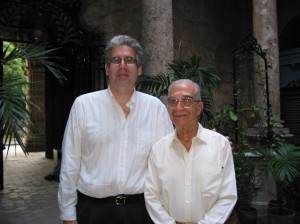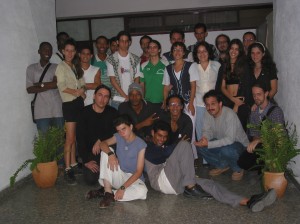Follow Scott
Recent Tweets
- Waiting for Twitter... Once Twitter is ready they will display my Tweets again.
Latest Photos
Search
Tags
anniversary Balticon birthdays Bryan Voltaggio Capclave comics Cons context-free comic book panel conventions DC Comics dreams Eating the Fantastic food garden horror Irene Vartanoff Len Wein Man v. Food Marie Severin Marvel Comics My Father my writing Nebula Awards Next restaurant obituaries old magazines Paris Review Readercon rejection slips San Diego Comic-Con Scarecrow science fiction Science Fiction Age Sharon Moody Stan Lee Stoker Awards StokerCon Superman ukulele Video Why Not Say What Happened Worldcon World Fantasy Convention World Horror Convention zombies
©2025 Scott Edelman
My December 9, 2002 Science Fiction Weekly editorial about Cuban science fiction
Posted by: Scott
Tags:
Angel Arango, Cuba, Science Fiction Weekly
Posted date:
March 2, 2013 |
No comment
Since I just told you of the passing of Angel Arango, I thought I’d share my thoughts on first meeting him, and why it was a crime I hadn’t learned of him earlier.
The following originally appeared in the December 9, 2002 Science Fiction Weekly (issue #294), which merged with SCI FI Wire in 2009 and morphed into Blastr in 2010. (FYI—I’ve been editing sites for Syfy since—gulp!—2000.)
90 Miles and a Million Light-Years From Home
I just got back from a visit—a visit which a year ago I would have said was impossible—to Cuba. For citizens of the United States, such legal visits are not an easy thing to pull off. Travel under a General License is limited to six very narrow categories, and I was lucky enough to fall into one of them. So during the week of Thanksgiving, I—along with Locus publisher Charles N. Brown and Locus executive editor Jennifer A. Hall—went to Havana to research the current state of Cuban science fiction. We timed our trip to coincide with the conference Cubaficción 2002, so that we’d be able to meet with as many Cuban writers, artists, editors and fans as possible.
Modern science fiction started out as an American invention, but now that over three-quarters of a century has passed, it has developed a presence throughout the world. Listening to the international voices of SF can change the way we feel about all SF. Last year, for instance, I visited Chengdu, the capital city of the Szechuan province, to visit the headquarters of Science Fiction World magazine and discover how things are done in China. That experience was so enlightening that this year I decided to reach out to yet another foreign community of the fantastic to learn more about its unique flavor of SF. As it turns out, though Cuba is only 90 miles off our shores, compared to China it is a far more distant country.
That artificial distance is damaging. You see, the culture of SF is one of dialogue. It always has been. Writers use stories to answer other stories, to talk back to other novels, to express their appreciation, anger, disappointment and more. Writers are challenged in their work by peers, editors and the fan community. As a result of this constant chatter, ideas are balanced one atop the other, achieving intellectual heights that no writer alone could reach. Progress in the field has always come about that way. Unfortunately, the wall that has been built between Cuba and the United States has excluded the many talented Cuban writers from this dialogue, and we feel this absence as much as they do.
Before I visited Havana, for example, I knew nothing of Angel Arango (shown with me above), the dean of Cuban science fiction, whose first short story was published back in the ’50s, making him that nation’s Jack Williamson. Nor did I know anything about the newer generation of Cuban SF writers. One night, sitting around in the Ambos Mundos Hotel with a group of writers, trying to grasp the nature of their community, I asked, “Who is your William Gibson?” One writer, Alex Padron, pointed to himself and his frequent partner, Michel Encinosa Fú, and said, “We are.” I should have known that, should have been able to read these writers before, to judge them for myself. They deserve to be a part of the dialogue.
Hearing Havana’s SF Voices
There are two main impediments to the development of a thriving science-fiction field in Cuba, one that will allow their unique voices to be heard throughout the world. One is a matter of economics, the other that of a lack of artistic respect. From the vantage point of an outsider who was granted but a brief glimpse of the way things work in Havana, it is difficult for me to tell which of these problems will be the easiest to solve.
As far as lack of respect for the literature of the fantastic, we know all about that here in the United States. Even with SF permeating every aspect of modern life, writers are still often asked, “When are you going to write a real novel?” It’s a battle we’ve been fighting here for years. “When will you put aside that Star Wars stuff and try telling some serious stories?” We’ve achieved some success here, success that will eventually come for the Cuban writers as well. All that it will take is time. SF is a younger art form in Cuba than in the Unites States, and I’m sure that as it matures, as it proves to its nation what we gathered here already know, that SF is more than just rayguns and rocket ships and robots, the country will respond.
But then there’s the matter of money. A book can easily cost a Cuban more than a month’s salary, so pleasure reading is hard to justify, and SF magazines and books are therefore more difficult for the casual reader to support. And to tie it into the respect issue above, mainstream books, on the surface less trivial, can be subsidized by the state in a way that SF is not. Some writers can’t even afford to get copies of their own books.
One writer shared with me something that happened at a recent Havana International Book Fair. The story may be apocryphal, but still, there is truth in such stories. A university student was caught stealing a copy of a book on ethics. He was asked, “Don’t you find it a bit unethical that you just stole a book on ethics?” And he responded, “Don’t you find it a bit unethical that your books cost so much?” The exhibitor decided to let him keep the book. With the price of books so high, it’s difficult to foster a native Cuban SF field. Fans and fellow writers cannot afford to support homegrown talent, not when books published in Spain and Mexico are available more cheaply.
Luckily, the Internet is helping keep the field alive, thanks to Web sites such as Gerardo Chávez Spínola’s El Guaicán Literario, which can bind the field together less expensively than traditional print fanzines.
But these issues aside, one commodity of which the Cuban SF community has no shortage is passion. They want to join the rest of SF on the world stage. Every Thursday night, the next generation of creators (who can be seen above) meets to share their writing, pass around their art, watch movies, play games and discuss SF in general. On Thursday, Charles, Jennifer and I sat in on their meeting to learn from them and to encourage them.
They are already aware of many of our creators. They’ve read Dan Simmons and Philip K. Dick and Frank Miller and J.K. Rowling. They play Traveler and watch Minority Report (a film that was brought to Havana by Steven Spielberg personally just a few weeks before my own visit). They draw manga and anime and devour any new genre book they can find. They want to write novels, draw comic books, design games, direct films—all of the things that young SF fans dream of the world round.
Give them time. Give all of them time. Compared to the Unites States, SF is young still in Cuba. As the new millennium progresses, however, they have the talent and drive necessary to gain on us.


